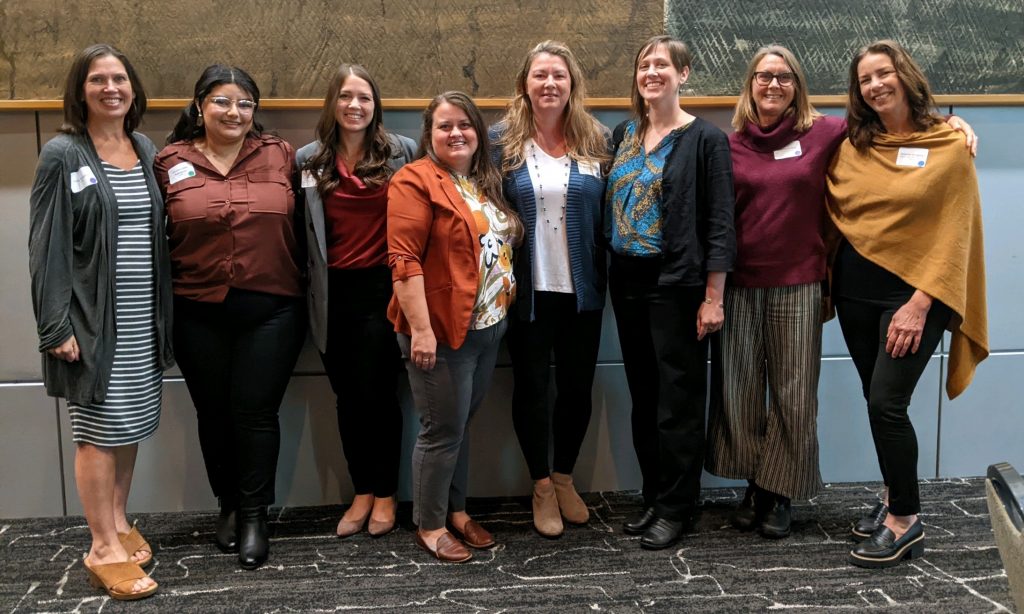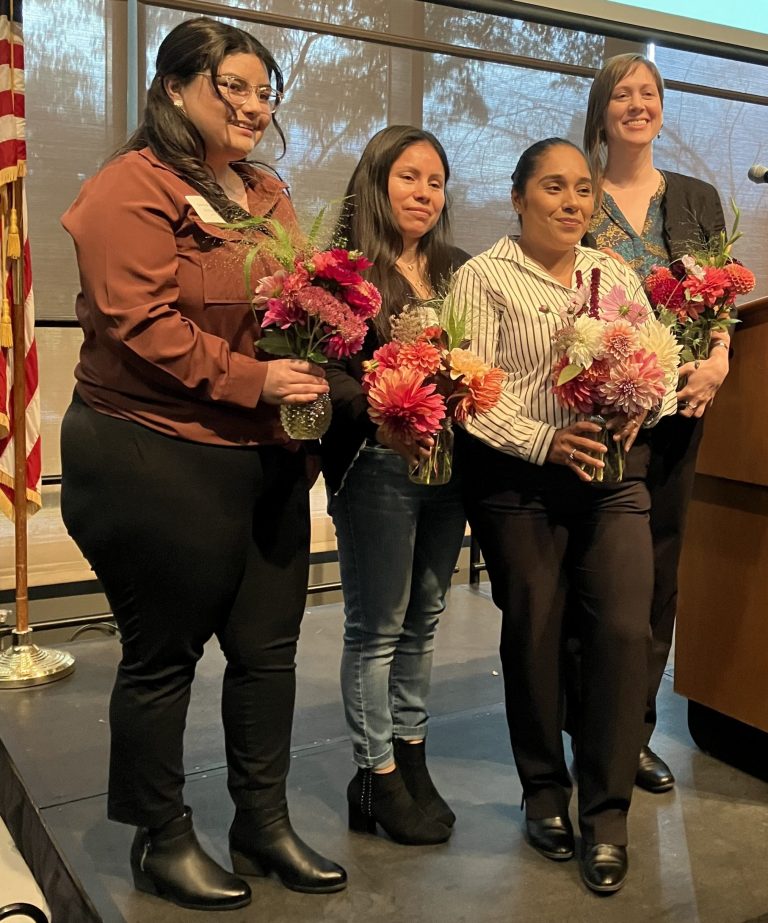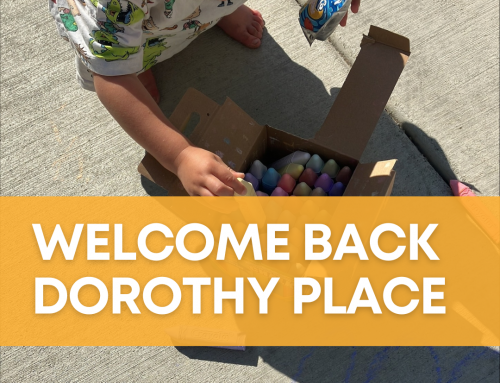Opportunity Council’s Center for Retention and Expansion of Child Care team was honored to be a part of the Powerful Partnerships event hosted by the Skagit County Population Health Trust earlier this month.
The C-RECC team attended the event at Skagit Valley College along with fellow members of the Early Learning and Family Services department of Opportunity Council. Many people filled the room at McIntyre Hall, from Population Health trust members and elected officials to local advocates and community leaders.

The C-RECC team from Opportunity Council get together for a photo. C-RECC, which stands for the Center for Retention and Expansion of Child Care, is a partnership that combats the child care shortage.
Removing Barriers for Child Care Providers
As part of the event program, Community Health Analyst Kristen Ekstran and Prevention & Community Health Manager Jennifer Sass-Walton facilitated a panel discussion highlighting the work of C-RECC and our new employer-supported child care pilot project.
The panel lineup started with Sandra Lopez Rodriguez, C-RECC’s Skagit-County-based bilingual marketing and recruitment coordinator. Sandra shared about the ways C-RECC works to advocate for child care providers and remove barriers to starting their own child care businesses.

C-RECC helped a child care provider find a fencing solution that maintained both safety and visibility.
In one poignant story, she told the crowd about a prospective child care provider in Sedro-Woolley who was receiving mixed messages about fencing regulations from the Department of Children, Youth and Families (DCYF) and the city.
Guidelines from DCYF were largely safety-based and those from the city were largely meant to preserve visibility. These conflicting guidelines could have delayed the startup process significantly.
Thankfully, C-RECC was able to facilitate conversations with all parties involved. By acting as a liaison between parties, our team helped the potential provider navigate the process of finding a solution. The prospective provider was able to find a fencing system that resolved the issue and maintained both safety and visibility. They are now open for business with their license through DCYF!
Spotlight on a Groundbreaking Partnership
Sandra also shared about how C-RECC promotes key collaboration in our communities. The team recently facilitated the employer-supported child care pilot project partnership and awarded Escuela el Jardin $75,000 in grant funding from ARPA dollars allocated by Skagit County Commissioners. This funding has supported the purchase of classroom materials and renovations required for licensing.
The project represents innovative cross-sector collaboration. In addition to the nonprofit and government support, the pilot features a partnership between a local business and a child care provider to help fill in child care gaps in Skagit County.
Both businesses participating in the partnership were also represented on the panel. Bay Baby Produce Operations Manager, Veronica Sanchez Flores, spoke about the project and how she was elated to collaborate with Silvia Alvarez, the owner of soon-to-open child care center, Escuela el Jardín. Silvia is a local community advocate and child care business owner who will be opening the center with an anticipated 80 spots.
Inclusive and Culturally Responsive Child Care
With this partnership, Bay Baby Produce will initially support Escuela el Jardín financially in exchange for at least ten child care slots being reserved for the Bay Baby workforce each year. Any child care slots that aren’t utilized by Bay Baby Produce families will be opened to the community.
The child care center will also offer extended hours in accordance with local farm cycles to accommodate these families working in the agricultural sector. These non-traditional hours are a huge need in Skagit County and the surrounding areas.
Teachers will speak Spanish and/or the indigenous languages Mixteco or Triqui. These language offerings will help provide child care in the children’s heart languages and create a welcoming environment. Plans are in the works to incorporate a selection of produce from Bay Baby into the child care center’s menu, and seeds may be used in gardening programs.
Hope for Healthy Communities

Our C-RECC team was honored to be a part of the Powerful Partnerships event hosted by the Skagit County Population Health Trust.
To round out the child care panel, we heard from our colleague Toni Carter, Opportunity Council early learning coach and Northwest Child Care for WA advocacy lead.
Toni spoke about the importance of supporting both child care providers and families. She also shared some exciting updates about current statewide efforts to garner more government funding for child care.
Two awards highlighted the impact of local community members on Skagit County. Also on the agenda were presentations and Q&A sessions with Population Health Trust members on various topics like child care, the opioid crisis and food security.
It was inspiring to see the interconnected community efforts and to see how a spirit of collaboration is bolstering Skagit County efforts toward community health. Our C-RECC team is dedicated to helping children, families and communities thrive. We hope to continue facilitating employer-supported child care solutions like the Skagit pilot project that benefit families, businesses and the local economy.
Big thanks to Skagit County and the Population Health Trust for the privilege of sharing about our work at the Powerful Partnerships event!
C-RECC, a program of Opportunity Council, works to boost the economy and support children and families by increasing child care capacity across Northwest Washington. To learn more about becoming a child care provider, supporting employees and their families through childcare, or partnerships like this one, explore our website and reach out to C-RECC at info@creccnw.org.





